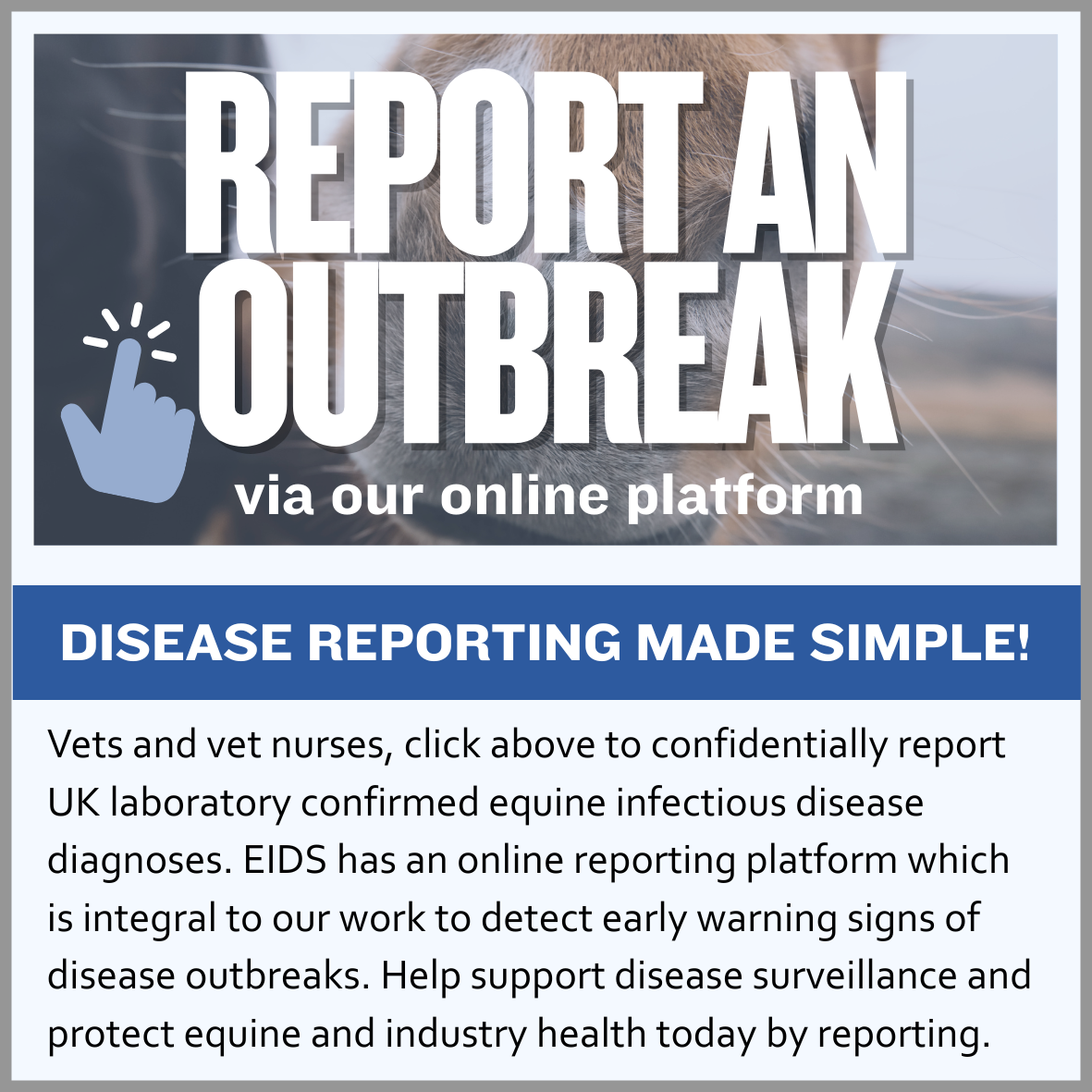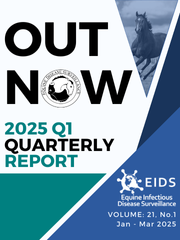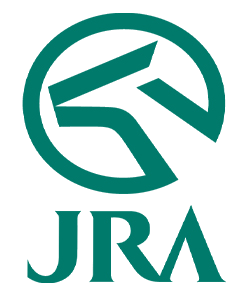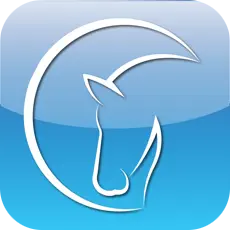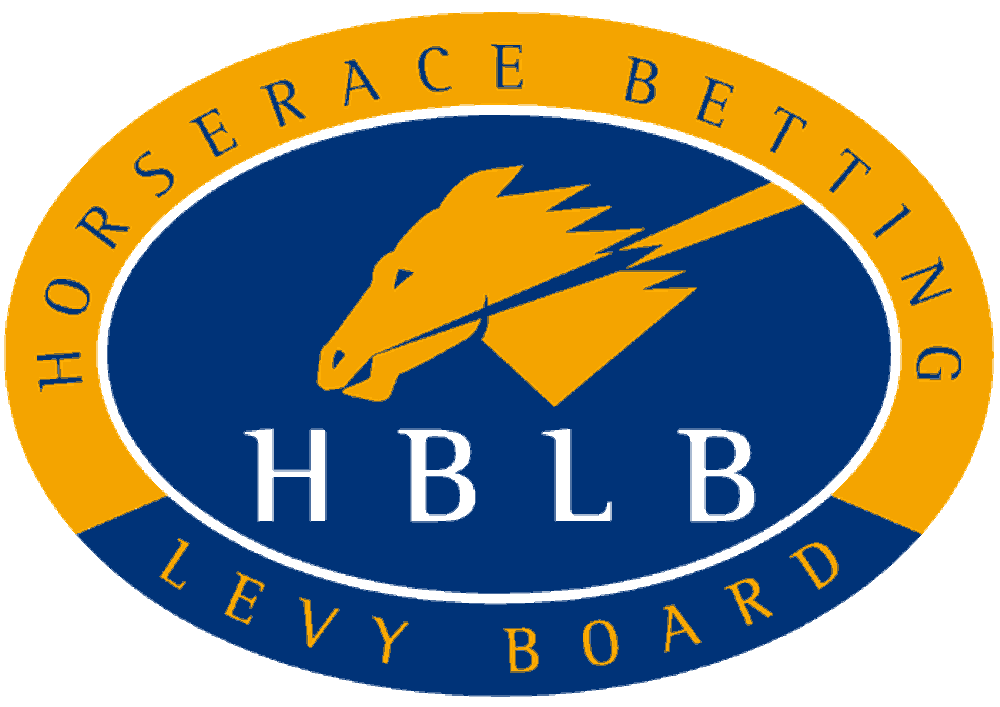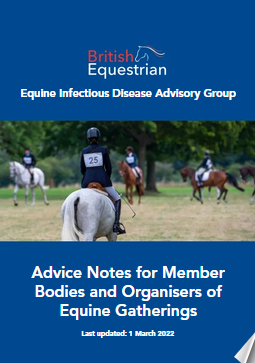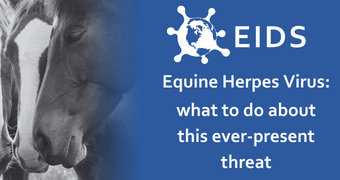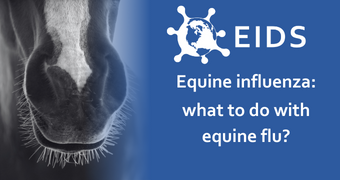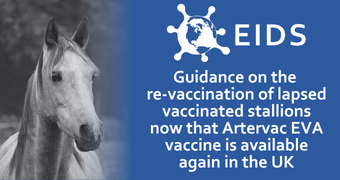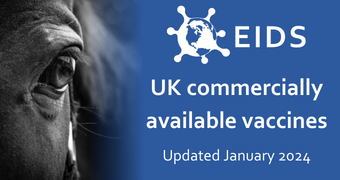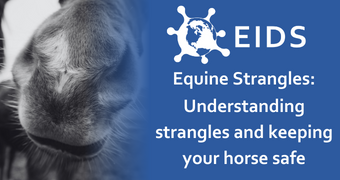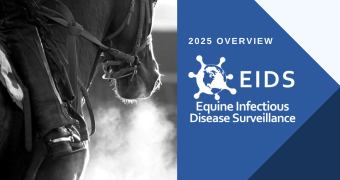Equine Infectious Disease Surveillance

Equine Infectious Disease Surveillance (EIDS) is generously funded by the UK's Thoroughbred industry and is based at Cambridge University. The EIDS team collaborates with equine industry stakeholders to control and prevent equine infectious disease occurrences in the UK. They oversee numerous surveillance schemes to aid the identification and reporting of specific infectious disease occurrences and provide a disease control advice service for veterinary surgeons. EIDS also collate and share disease information, through platforms such as the International Collating Centre (ICC), EquiFluNet and the Equine Quarterly Disease Surveillance report, which is produced by EIDS in collaboration with BEVA and Defra/APHA.
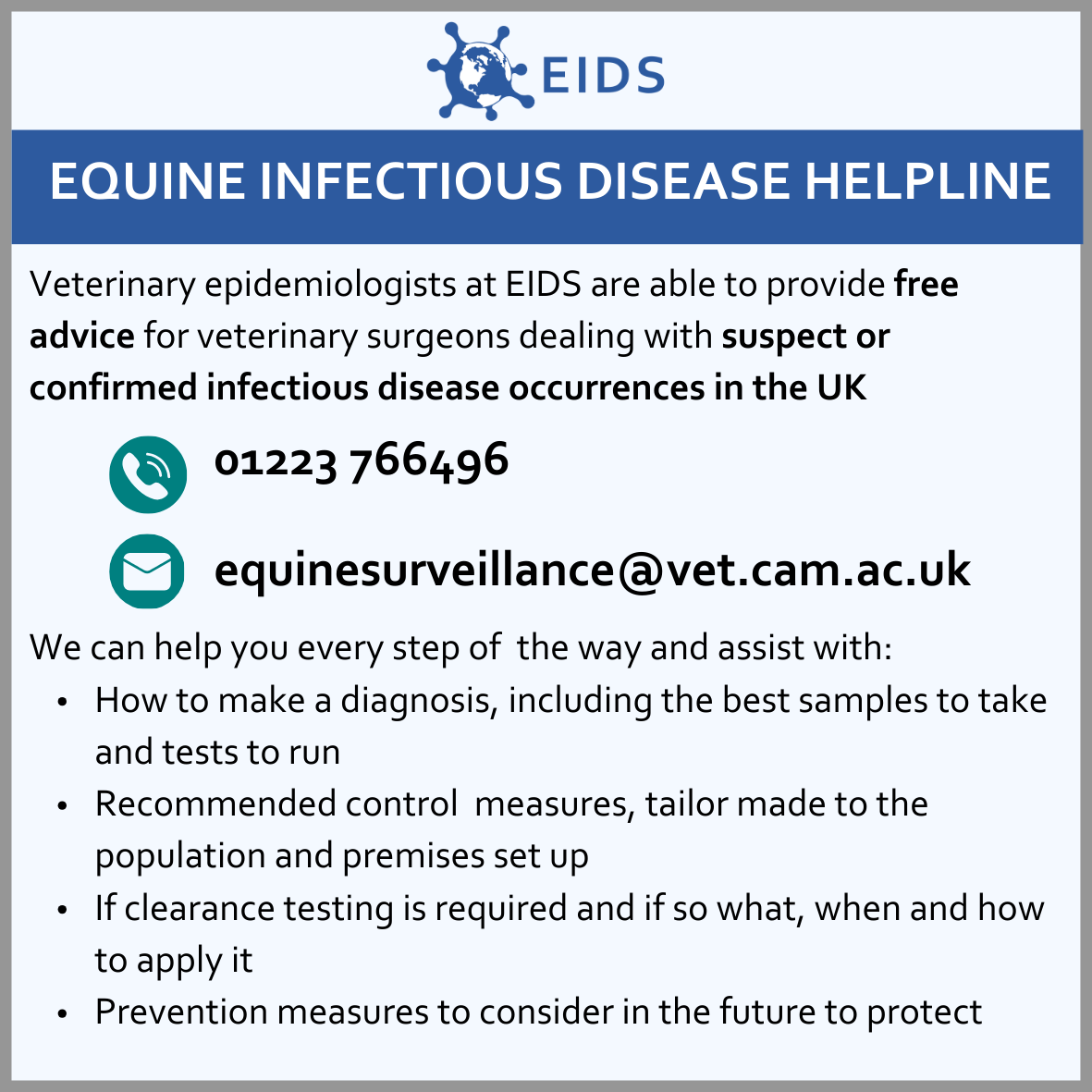
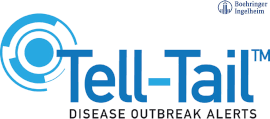
Tell-Tail
alert service
Outbreak reports for vets, by text message, supported by Boehringer Ingelheim
Sign up here »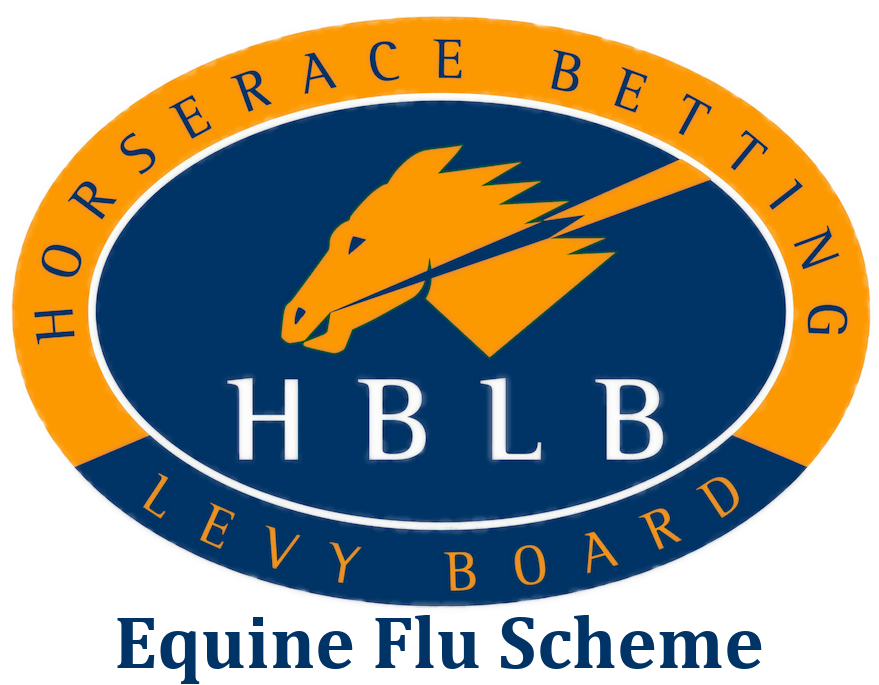
HBLB
Flu Scheme
Horserace Betting Levy Board (HBLB) funded equine influenza surveillance scheme
Flu Scheme »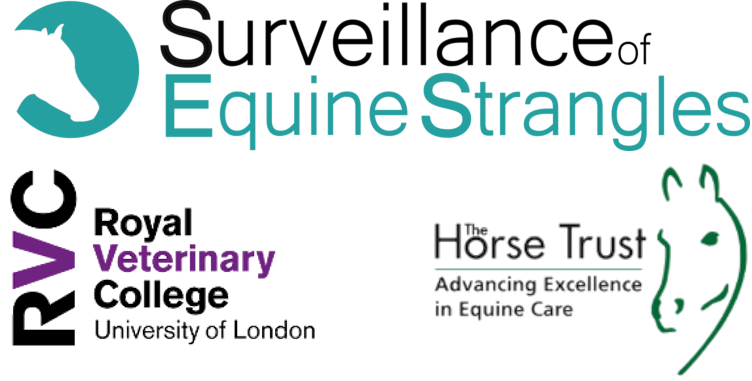
Surveillance of
Equine Strangles
UK diagnostic laboratory based surveillance network of positive diagnoses of Strangles
Go to website »
Redwatch
Redworm Surveillance
RedWatch is a surveillance initiative focusing on small and large strongyle disease occurrences in the UK. It gathers essential case data to better understand disease patterns and risk factors
Go to website »Surveillance reports
To view our latest report please click the thumbnail below. In the list of current and previous articles below that, prior reports can be accessed by clicking the relevant Quarter link
.
Reports repository
Outbreak information is obtained from multiple sources and these mainly include country based infectious disease reporting systems, such as the USA’s Equine Disease Communication Centre (EDCC) and France’s Réseau D’épidémio-Surveillance En Pathologie Équine (RESPE). Reported outbreaks are predominately made up of at least one case that has had the diagnosis confirmed through laboratory testing. Outbreaks may be reported to the disease reporting sources by the testing diagnostic laboratory or by vets voluntarily reporting outbreaks.
The interactive ICC website enables analysis of all international infectious disease outbreaks reported through the ICC. It was launched in August 2019 and outbreak data for all of 2019 to date is available through this platform and will be maintained going forward. Through the ICC and this interactive reporting system, infectious disease outbreak information is shared with stakeholders throughout the world. This should ensure people can be aware and up to date and provides a great communication network.
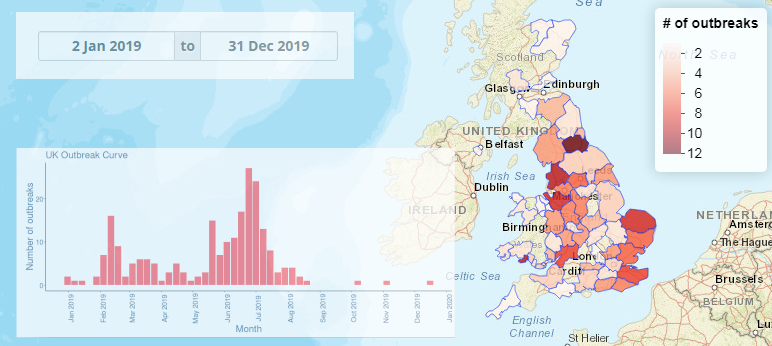
The Horserace Betting Levy Board (HBLB) funded equine influenza (EI) surveillance scheme provides free of charge PCR testing for suspected cases of equine flu in the UK. The laboratory testing is conducted on behalf of EIDS and HBLB by Rossdales Laboratories for samples submitted with an appropriately completed scheme submission form.
Why use the HBLB-funded equine influenza surveillance scheme?
This scheme is intended to assist treating vets in confirming if influenza is present on a premises and in particular where there may be financial constraints on pursuing diagnostic testing. Importantly, the scheme is intended to also encourage testing in EI vaccinated horses with clinical respiratory signs, which may be suggestive of failure of vaccine efficacy. A prompt diagnosis helps to ensure successful implementation of control measures for an infected premises, limiting spread of flu and its impacts on the industry and welfare of horses. On confirmation of a positive diagnosis of EI, veterinary epidemiologists at EIDS will be able to assist equine vets with relevant outbreak advice.
This scheme also enables epidemiological and virological information to be obtained which is vital to ensure preventive measures such as vaccination are optimally used in our horse population in the UK. Identifying risk factors for outbreaks can assist in the design of premises specific biosecurity measures. Virological analyses determine if current vaccines are likely to maintain levels of protection against the circulating field strains of flu virus. Information obtained through this scheme is shared anonymously with stakeholders, through International Collating Centre (ICC) reports, Tell-Tail text alerts which include a link to the ICC report and on the EquiFluNet website. Anonymised data also contribute to further influenza research studies, which are intended to mitigate future major outbreaks of this highly infectious equine respiratory disease.
Which horses can be sampled on the HBLB scheme?
- Any unvaccinated horse with typical influenza clinical signs (that may include combinations of coughing, nasal discharge, fever and inappetence)
- Vaccinated horses with clinical respiratory signs, which may though be milder than those seen in unvaccinated animals
Which samples are covered for free PCR testing on the HBLB scheme?
- Nasopharyngeal swabs taken within 5 days of clinical signs first being noted (see Figure below)
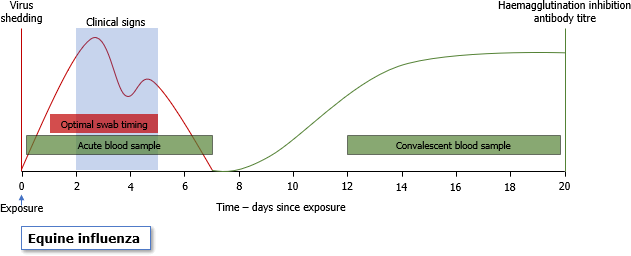
Forms and Resources
Below are resources and forms for use by veterinary practices and laboratories collaborating with our various projects. Please click on the associated link to download the resource/form.
The EIDS Outbreak Information Form is for use by veterinary practices to report details of confirmed cases of equine infectious diseases, following laboratory diagnosis in the UK. This information will then be used as the basis for an anonymised report at the county level issued by the International Collating Centre (ICC), which is our international disease dissemination platform and can be accessed here. On completion of the EIDS Outbreak Information Form, please ensure it is returned to us here.
The HBLB Equine Influenza Surveillance Scheme Form is for use by veterinary practices to submit nasopharyngeal swabs from potential equine influenza cases for complementary laboratory testing, funded by the HBLB. Please note that under this scheme, only the laboratory test costs are covered and this form will need to be completed, printed and submitted with a sample to Rossdales Laboratories, who are partnering the scheme, for it to be eligible.
The Viral Isolate Library Sample Submission Form is for use by diagnostic laboratories to submit samples that they have detected positive for equine viruses (such as EIV, EHV-1, EHV-4, EHV-3, EAV) to the UK Thoroughbred industry-supported Viral Isolate Library, which is now based at Rossdales Laboratories. These sample submissions enable further investigation on viral genomics and strain variation and this form should be completed, printed and submitted with samples.
Public Resources
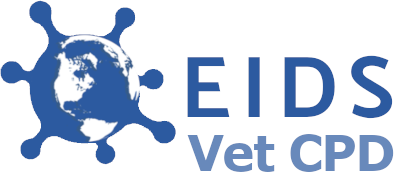
Continuing Professional Development
What we do and who we are
The Equine Infectious Disease Surveillance (EIDS) team is a small, independent, UK-based group made up of equine veterinary epidemiologists (Dr Richard Newton FRCVS, Fleur Whitlock MRCVS and Dr Abigail McGlennon BSc, PhD) with support secretariat (Maire O'Brien) and is funded by the equine industry. The team is able to assist with the prevention, diagnosis, management and containment of a wide range of equine infectious diseases and to advise veterinary practices on sampling, vaccination, biosecurity and the most appropriate control of different disease situations. The team can be emailed and somebody from the group will respond promptly.
The EIDS Brochure
If you'd like to learn more about EIDS, please read our latest brochure, which offers a summary of the EIDS team, our disease outbreak alert systems, our free UK vet advice line, and our surveillance projects. Simply click the image below to view it.
Case study
A recent case illustrates the type of assistance that can be provided. In May 2021, a treating veterinary surgeon was dealing with an outbreak of pyrexia and neurological signs on a livery yard with over 60 horses. Preliminary laboratory diagnostics had confirmed cases to be positive for equine herpes virus-1 (EHV-1). There had already been two neurological cases that had required euthanasia due to the severity of their signs. Discussion with our veterinary epidemiologists from the outset enabled the right control measures to be put in place as quickly as possible, to limit further spread of EHV-1. Horses were designated into small groups and each group was isolated from other groups. Additional diagnostic sampling was conducted to understand the extent of the spread of EHV-1 on the premises and this included nasopharyngeal swabs for EHV-1 PCR and blood samples for EHV-1 serology. The results of this testing were analysed by our team and used to determine the next steps that should be taken on the premises. Strict biosecurity measures were kept in place for two weeks and the treating vet kept in regular contact with our epidemiologists. Clearance testing was then conducted to demonstrate that the virus was no longer circulating on the premises. Through a quick diagnosis by the treating vet and effective implementation of control measures to limit further spread, clearance testing demonstrated that the premises could lift restrictions. Ongoing, a biosecurity plan was implemented to reduce the risk of such outbreaks in the future and our epidemiologists assisted in the specifics of this to ensure they were relevant to the premises set-up and the population of resident horses. For the ICC report in this outbreak please follow this link.

Richard Newton BVSc MSc PhD FRCVS
After several years in general mixed practice Richard joined the Animal Health Trust, based near Newmarket, Suffolk, the headquarters of British racing, where he acquired a breadth of experience in the epidemiology, surveillance and control of a range of equine infectious diseases, including influenza, strangles and equine herpesvirus. He was the Director of Epidemiology and Disease Surveillance and Acting Director of Research at the Trust when it closed in July 2020. Richard and his immediate team have been retained by the UK Thoroughbred racing and breeding industry and they continue to provide global disease surveillance and advice on disease prevention strategies and management of outbreaks. More recently he has been working as part of the International Equestrian Federation (FEI) Veterinary Epidemiology Working Group, advising the FEI on outbreak management and return to competition following a large outbreak of EHV-1 neurological disease affecting horses attending showjumping events in Spain and Portugal in February and March 2021.
LinkedIn
Fleur Whitlock BVetMed (Hons) MSc MRCVS
Fleur qualified from the Royal Veterinary College, London in 2012 and following an internship in Dubai, she worked in clinical equine practice in the UK. In 2017 she joined the Epidemiology and Disease Surveillance team at the Animal Health Trust. Fleur works closely with vets to aid infectious disease diagnosis, control and prevention. She also assists with the running of our surveillance schemes and collation of our numerous surveillance reports. Fleur enjoys promoting equine infectious disease epidemiology and regularly provides lectures and educational material on this topic. Fleur also completed a Veterinary Epidemiology and Public Health Masters in 2021 at the Royal Veterinary College.
LinkedIn
Maire O'Brien
Having spent 16 years working in London and a year working in Australia, Maire moved backed to Bury St Edmunds and started working as a temp covering maternity leave at the Animal Health Trust and remained there for 22 years (!!) working as Richard Newton's secretary and admin support to the Epidemiology and Disease Surveillance team. When the AHT sadly closed Maire was also retained by the UK Thoroughbred racing and breeding industry and is the first point of contact for the Equine Infectious Disease Surveillance team and always happy to help with any enquiries you might have (email). Maire is involved in the production and circulation of International Collating Centre disease reporting platforms and Defra/BEVA Equine Quarterly Disease Surveillance Reports, working closely with Richard Newton and Fleur Whitlock on these initiatives.
LinkedIn
Abigail McGlennon
BSc (Hons), PhD
Abbi graduated from Nottingham Trent University and joined the Epidemiology and Disease Surveillance team at the Animal Health Trust in 2017. Abbi is the lead developer of the Surveillance of Equine Strangles (SES) network which collates and reports on UK based laboratory diagnoses of strangles and has been operational from 2018. Abbi has since completed a doctorate in veterinary epidemiology based at the Royal Veterinary College examining the epidemiology, transmission and genomics of UK laboratory diagnosed strangles cases between 2015 and 2022. Abbi joins the EIDS team to update and streamline the SES network and assist the EIDS team with the collation of surveillance reports and scientific communication and engagement for multiple industry groups.
LinkedIn
John Grewar BVSc, MSc, PhD
John qualified from the University of Pretoria, South Africa in 2006 and obtained an MSc and PhD in 2009 and 2020 respectively. He is a registered Veterinary Epidemiologist in South Africa and has been involved with the development and modernisation of the various equine disease reporting systems used by EIDS. He is the founder and director of jDATA (Pty) Ltd
LinkedInThanks to all our sponsors and supporters
News and Updates
Click item detail to view
Sign up to EIDS services

Equine flu: free testing scheme
Is your practice signed up to the Horserace Betting Levy Board (HBLB) funded equine influenza surveillance scheme, for free PCR testing of suspect equine influenza cases? Click here » to find out more and download submission forms for testing conducted by Rossdales Laboratories. To enrol your practice click below.
Vet Practices enrolment

Get Tell-Tail alerts
Sign up to receive text message disease outbreak alerts when a case/outbreak of equine influenza, equine herpes virus (abortion, neonatal infection, neurological disease), or an equine notifiable disease is confirmed in the UK.
Sign up
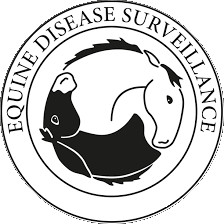
Quarterly equine disease surveillance reports
Receive the Equine Quarterly Disease Surveillance Report by email, as soon as it is published. This report provides vets with key, up to date information about equine infectious disease occurrences and current advisories about their control and prevention. Reading the report can also be logged as free CPD! Please email equinesurveillance@vet.cam.ac.uk and request your email address to be included on the subscriber list
Email
equinesurveillance@vet.cam.ac.uk
to subscribe

International outbreaks
If you are interested in near real-time emails about international infectious disease occurrences, sign up to receive International Collating Centre (ICC) reports by emailing us at equinesurveillance@vet.cam.ac.uk and request your email address to be included on the subscriber list.
Email
equinesurveillance@vet.cam.ac.uk
to subscribe

Get Atypical Myopathy Alerts
Sign up to the University of Liege's Atypical Myopathy Alert Network (AMAG), enabling swift reporting and widespread alerts for equine owners and vets to tackle outbreaks of atypical myopathy. This initiative aims to enhance diagnosis, identify survival factors, and improve preventive measures by collecting comprehensive clinical and epidemiological data on reported cases.
Sign up

Use EIDS's free helpline
EIDS have a free equine infectious disease advice service for UK-based veterinary surgeons. Call 01223 766496 or email us at equinesurveillance@vet.cam.ac.uk.
Email
equinesurveillance@vet.cam.ac.uk
for assistance

Contribute information
Keep on contributing to equine infectious disease surveillance by sampling suspect infectious diseases cases ands supplying EIDS with outbreak info for positive cases by filling out an outbreak info form.
